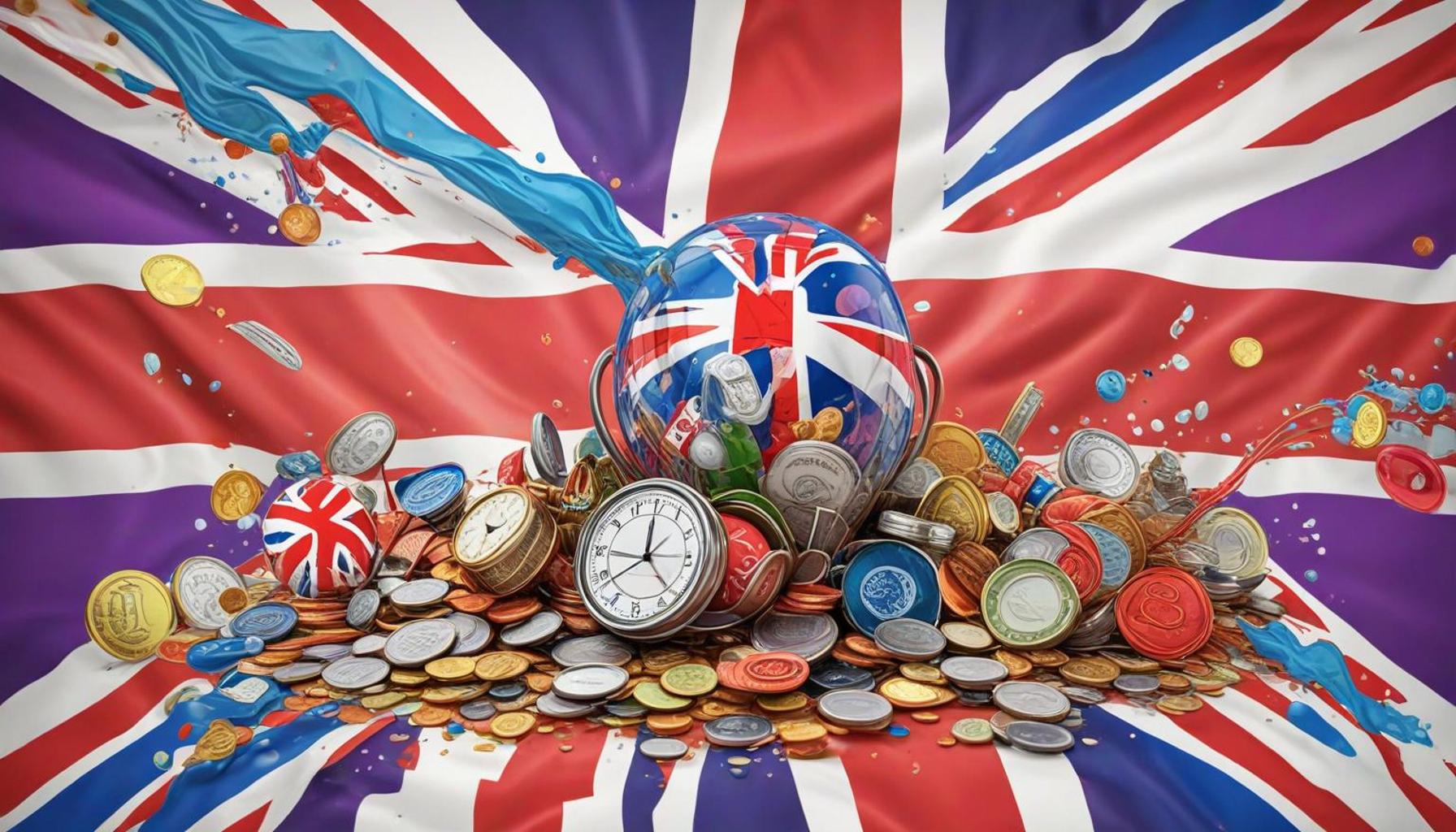Understand how inflation affects your purchasing power in the United Kingdom

The Effects of Inflation on Consumers in the UK
Inflation is a crucial economic factor that shapes the financial environment, affecting the daily lives of individuals and families. The recent trends of rising inflation in the United Kingdom have left many consumers grappling with the reality that their hard-earned money can purchase fewer goods and services than before. As inflation soars, wages often fail to keep pace, leading to increased financial strain for households.
Understanding Purchasing Power
Purchasing Power: This concept refers to the value of currency in terms of the quantity of goods or services it can buy. When inflation rises, the purchasing power of your income diminishes; for example, a pint of milk that cost £0.80 last year might now cost £1.00, which may not seem like a steep increase, but over time, these small amounts add up significantly. If your wages do not rise correspondingly, you find yourself with less ability to satisfy your basic needs.
The Impact on Essential Goods
Essential Goods: Households typically notice inflation’s effect first in the prices of everyday items, like groceries and utility bills. For instance, the cost of staple foods such as bread, vegetables, and meat has seen notable increases. A report in recent months highlighted that shoppers in the UK were facing a 12% rise in grocery prices. Furthermore, energy bills have spiked, particularly following changes in global oil prices and fluctuations in demand due to seasonal factors. These increases create immediate and distinguishable challenges for households and can lead to budget reallocations and difficult financial decisions.
Inflation and Investments
Investments: Inflation doesn’t just eat into your immediate purchasing power; it can have long-term implications on savings and investments. Money sitting in a savings account may earn interest, but if the inflation rate exceeds that rate, the real value of your savings declines. Those with investment portfolios need to pay attention, as some investments may not keep up with inflation. For example, traditional fixed-income investments like bonds may offer lower yields during times of high inflation. Consequently, individuals may need to consider alternative investment strategies, such as stocks or real estate, which historically have shown resilience against inflationary pressures.
Strategies to Combat Inflation
In response to rising inflation, many wonder how to safeguard their finances. Awareness is key; staying informed about economic trends can empower consumers to make choices that enhance financial stability. Strategies may include:
- **Diversifying investments** to include assets that traditionally outpace inflation.
- **Budgeting more effectively** to prioritise essential spending and avoid overspending on non-essentials.
- **Exploring inflation-linked savings options** that adjust to economic changes.
In conclusion, understanding inflation’s dynamics is vital for anyone looking to secure their financial future. By learning about its impact on purchasing power, essential goods, and investments, consumers can make informed decisions and adapt to the ever-changing economic landscape. Awareness not only empowers you but equips you with the knowledge needed to thrive, despite the challenges inflation may present.
SEE ALSO: Click here to read another article
The Ripple Effects of Inflation on Your Wallet
The intricate relationship between inflation and purchasing power is a reality that many UK residents are becoming acutely aware of. As prices rise, the effects are deeply felt not just in a subtle manner, but as a profound impact on everyday life. Understanding this relationship is essential for consumers who wish to navigate their finances effectively in an environment marked by economic volatility.
How Inflation Alters Your Daily Budget
Daily Budget: As inflation nudges prices upwards, households must grapple with the challenge of managing a budget that stretches increasingly thin. Each increase in the cost of living prompts consumers to reassess their spending habits. For example, a family that routinely allocates a certain amount for groceries may find that what once sufficed is now inadequate. Recent studies show that over the past year, the typical family food bill has surged, with estimates indicating that the average household is spending nearly £25 more per week on groceries alone.
The Hidden Costs of Inflation
Hidden Costs: Although some price increases are straightforward, others manifest subtly, leading to what can be termed “hidden costs.” For instance, while some items may see clear price hikes, others may be downsized in quantity or quality—a phenomenon known as “shrinkflation.” A popular example in the UK is seen with snacks and household products whose packaging remains the same, but the amount of product inside has decreased, effectively costing the consumer more per unit. Understanding these nuances can equip consumers to make wiser choices and identify value when faced with inflated prices.
Assessing Inflation’s Influence on Lifestyle Choices
Lifestyle Choices: Increased inflation can profoundly affect lifestyle decisions across the spectrum. As disposable income shrinks, families may choose to forgo vacations or entertainment in favour of prioritising essentials. Not only does this shift affect personal well-being, but it also has broader implications for the economy. For instance, a decline in consumer spending can lead to slowing economic growth, affecting businesses and, subsequently, job markets. A recent survey indicated that 67% of UK consumers have cut back on non-essential purchases due to rising prices, a trend that signals wider economic concerns.
Practical Strategies for Savvy Consumers
To counteract the pressures of inflation, consumers are taking decisive action. Here are some practical strategies to consider:
- Shopping smart: Consider bulk buying or opting for own-brand products that often offer superior value.
- Comparative pricing: Use price comparison websites to ensure you are getting the best deal possible.
- Meal planning: This strategy not only reduces food waste but helps to better control expenditures on grocery shopping.
In summary, understanding the effects of inflation on purchasing power isn’t merely an academic exercise; it’s a necessary component of sound financial management. By grasping how inflation influences daily expenses, lifestyle choices, and budgeting, consumers can be better prepared to seek alternatives and make choices that safeguard their financial health.
SEE ALSO: Click here to read another article
Inflation’s Broader Economic Impact and Personal Finance Strategies
The influence of inflation surpasses mere price increases, extending into the complex realm of interest rates, savings, and investments. Understanding these broader economic repercussions becomes critical as consumers seek to maintain their financial resilience amidst changing economic landscapes.
The Relationship Between Inflation and Interest Rates
Interest Rates: A pivotal aspect of inflation is its relationship with interest rates, often manipulated by the Bank of England to control economic growth. When inflation rises, regulatory bodies typically respond with higher interest rates. This reaction aims to discourage excessive spending and borrowing by increasing the cost of loans. For consumers with mortgages or other debt, rising interest rates can lead to increased monthly payments, thereby stretching monthly budgets even thinner. For instance, a 1% increase in interest rates on a £200,000 mortgage could raise monthly repayments by approximately £100, exacerbating financial strain for many households.
The Erosion of Savings
Savings Impact: As inflation rises, the purchasing power of savings diminishes correspondingly. For instance, if the inflation rate exceeds the interest earned on savings accounts, the real value of those savings declines. Currently, many high-street banks offer interest rates that lag significantly behind inflation, leaving savers with little incentive to keep money in low-yield accounts. Data from the Office for National Statistics indicates that inflation outpaced typical savings account interest rates in 2023, eroding the value of accumulated funds and drawing concern for future financial security.
Investments: Protecting Your Wealth
Investment Strategies: In an inflationary environment, thoughtful investment becomes paramount. Assets such as stocks, real estate, and commodities, historically provide a hedge against inflation as they tend to increase in value over time. For instance, property values in many UK regions have historically outstripped inflation. However, markets can be volatile, causing investors to tread carefully. Assessing risk tolerance and diversification can help mitigate potential losses. Furthermore, investment vehicles such as Inflation-Linked Bonds offer a safeguard against inflation, ensuring that returns keep pace with rising costs.
Budgeting Amidst Rising Costs
Effective Budgeting: Adapting to the challenges posed by inflation requires a fresh approach to budgeting. Embracing flexibility in expenditure can make a significant difference. For example, consumers might consider revisiting subscriptions and memberships to cut unnecessary costs. The current landscape sees a growing trend of individuals swapping expensive brands for value alternatives, particularly in sectors such as clothing and entertainment. Regular evaluation of expenses and conscious spending can aid individuals in tailoring budgets that reflect their current financial realities and mitigate the impact of rising inflation.
The Psychological Toll of Inflation
Psychological Aspects: Beyond the tangible financial impacts, inflation can also take a psychological toll on consumers. Financial instability breeds anxiety, as people may feel uncertain about the future of their purchasing power and financial security. Recent studies have shown that the persistent worry about rising costs influences lifestyle choices, prompting some to engage in defensive spending behaviours that may further entrench economic challenges. Understanding and acknowledging these psychological effects can be an essential first step in managing personal finances effectively.
As inflation continues to shape the financial landscape, understanding its multi-faceted impacts is critical for UK consumers. Awareness of the mechanics of inflation—from interest rates to the erosion of savings—equips individuals with valuable insight, enabling them to make informed financial decisions in an unpredictable economy.
CHECK OUT: Click here to explore more
Conclusion: Navigating the Inflationary Landscape
In conclusion, understanding how inflation affects your purchasing power is essential for making informed financial decisions in today’s economic climate. Inflation not only results in immediate price increases but also has far-reaching consequences on interest rates, savings, and investments. As we have seen, the ripple effect of rising inflation impacts consumers’ financial strategies significantly, from the burden of heightened borrowing costs to the crumbling value of savings held in traditional bank accounts.
It is critical for individuals to reassess their financial plans in light of these challenges. With inflation rates fluctuating, consumers should consider diversifying their investments to include assets that historically outshine inflation, like property and equities. Additionally, developing robust budgeting strategies can empower people to manage their expenditures, ensuring they remain agile and responsive to market changes. Cutting unnecessary expenses and switching to value alternatives can make a substantial difference in preserving purchasing power.
Moreover, being mindful of the psychological effects of inflation is vital. The anxiety surrounding financial insecurity can influence spending habits and overall wellbeing. By staying informed and proactive, consumers can navigate these uncertainties and safeguard their financial health. With increased knowledge and clear financial strategies, individuals in the United Kingdom can better adapt to inflation’s evolving nature, ultimately leading to enhanced economic resilience. The journey towards understanding and countering the effects of inflation is ongoing, encouraging readers to continue exploring and learning about personal finance in an ever-changing economy.

Beatriz Johnson is a seasoned financial analyst and writer with a passion for simplifying the complexities of economics and finance. With over a decade of experience in the industry, she specializes in topics like personal finance, investment strategies, and global economic trends. Through her work, Beatriz empowers readers to make informed financial decisions and stay ahead in the ever-changing economic landscape.





